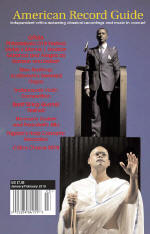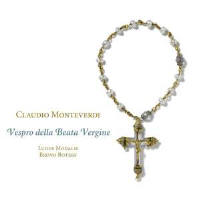Texte paru dans: / Appeared in: |
|
|
Outil de traduction ~ (Très approximatif) |
|
|
Reviewer: Catherine
Moore Yes, the main distinguishing feature of this recording of Claudio Monteverdi’s 1610 Vespro Della Beata Vergine is that Ludus Modalis uses the composer’s version without concertato instruments. No, I didn’t feel that anything was “missing” as a result of this interpretive decision. On the contrary, this is a full, satisfying, and well executed performance of Monteverdi’s masterpiece. From the two booklet essays we learn that this “specifically vocal version [...] is probably more firmly rooted in the polyphonic tradition of the Renaissance” and that it has “a more human aspect”. Here a 13-voice mixed choir is joined by harpsichord, one each of bass sackbut, bass cornett and bass viol, all grouped for the recording around an organ built in 2011 by Bernard Boulay in the 16th-Century style of Costanzo Antegnati.
Singers are combined in many different ways, from the nice tiers of cascading lines in the 10-part ‘Nisi Dominus’ psalm to the shapely and flexible solo tenor motet ‘Nigra Sum’ (sung here by ensemble leader Bruno Boterf ) and the fluttering tremolo gestures that depict clamoring angel wings, descent of the Holy Spirit and heavenly host in the tenor trio ‘Duo Seraphim’. The instrumental group lends splendid weight and texture to the tutti movements (in the big psalms, for example) and offers fitting variety and color elsewhere. It is only in a few passages of lagging pulse (in ‘Ave Maris Stella’) and some vocal strain (in ‘Magnificat’) that a certain tiredness comes into the music-making.
The performances are very good, and I welcome the opportunity to hear this alternate version of the Vespers. The second of the two Magnificats in the 1610 volume is used here, and Monteverdi’s 8-part instrumental sonata is replaced by two Frescobaldi pieces from the 1635 Fiori Musicali: ‘Toccata Avanti Il Recercar’ (solo organ) and ‘Recercar Con Obligo Di Cantar’ (organ, cornett, sackbut, 4 sopranos).
Notes,
bios, texts, translations. | |
|
|
|
|
Cliquez l'un ou l'autre
bouton pour découvrir bien d'autres critiques de CD |
|




